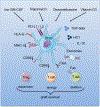Tolerogenic dendritic cells in organ transplantation
- PMID: 31472079
- PMCID: PMC6983332
- DOI: 10.1111/tri.13504
Tolerogenic dendritic cells in organ transplantation
Abstract
Dendritic cells (DCs) are specialized cells of the innate immune system that are characterized by their ability to take up, process and present antigens (Ag) to effector T cells. They are derived from DC precursors produced in the bone marrow. Different DC subsets have been described according to lineage-specific transcription factors required for their development and function. Functionally, DCs are responsible for inducing Ag-specific immune responses that mediate organ transplant rejection. Consequently, to prevent anti-donor immune responses, therapeutic strategies have been directed toward the inhibition of DC activation. In addition however, an extensive body of preclinical research, using transplant models in rodents and nonhuman primates, has established a central role of DCs in the negative regulation of alloimmune responses. As a result, DCs have been employed as cell-based immunotherapy in early phase I/II clinical trials in organ transplantation. Together with in vivo targeting through use of myeloid cell-specific nanobiologics, DC manipulation represents a promising approach for the induction of transplantation tolerance. In this review, we summarize fundamental characteristics of DCs and their roles in promotion of central and peripheral tolerance. We also discuss their clinical application to promote improved long-term outcomes in organ transplantation.
Keywords: dendritic cells; immune tolerance; organ transplantation.
© 2019 Steunstichting ESOT.
Figures
Similar articles
-
Tolerogenic dendritic cells and their role in transplantation.Semin Immunol. 2011 Aug;23(4):252-63. doi: 10.1016/j.smim.2011.06.007. Epub 2011 Jul 7. Semin Immunol. 2011. PMID: 21741270 Free PMC article. Review.
-
Tolerogenic Dendritic Cells: The Pearl of Immunotherapy in Organ Transplantation.Front Immunol. 2020 Oct 6;11:552988. doi: 10.3389/fimmu.2020.552988. eCollection 2020. Front Immunol. 2020. PMID: 33123131 Free PMC article. Review.
-
Manipulation of Regulatory Dendritic Cells for Induction Transplantation Tolerance.Front Immunol. 2020 Oct 14;11:582658. doi: 10.3389/fimmu.2020.582658. eCollection 2020. Front Immunol. 2020. PMID: 33162996 Free PMC article. Review.
-
Regulatory dendritic cell therapy in organ transplantation.Transpl Int. 2006 Jul;19(7):525-38. doi: 10.1111/j.1432-2277.2006.00306.x. Transpl Int. 2006. PMID: 16764631 Review.
-
Manipulation of dendritic cells for tolerance induction in transplantation and autoimmune disease.Transplantation. 2002 Jan 15;73(1 Suppl):S19-22. doi: 10.1097/00007890-200201151-00008. Transplantation. 2002. PMID: 11810056 Review.
Cited by
-
Immunology in corneal transplantation-From homeostasis to graft rejection.Transplant Rev (Orlando). 2025 Apr;39(2):100909. doi: 10.1016/j.trre.2025.100909. Epub 2025 Jan 9. Transplant Rev (Orlando). 2025. PMID: 39798206 Review.
-
The Human Neonatal Skin Fibroblast, an Available Cell Source for Tissue Production and Transplantation, Exhibits Low Risk of Immunogenicity In Vitro.Int J Mol Sci. 2024 Jun 26;25(13):6965. doi: 10.3390/ijms25136965. Int J Mol Sci. 2024. PMID: 39000078 Free PMC article.
-
High-throughput screening identification of novel immunomodulatory combinations for the generation of tolerogenic dendritic cells.Front Med (Lausanne). 2024 Jan 5;10:1298424. doi: 10.3389/fmed.2023.1298424. eCollection 2023. Front Med (Lausanne). 2024. PMID: 38249971 Free PMC article.
-
Local delivery strategies to restore immune homeostasis in the context of inflammation.Adv Drug Deliv Rev. 2021 Nov;178:113971. doi: 10.1016/j.addr.2021.113971. Epub 2021 Sep 13. Adv Drug Deliv Rev. 2021. PMID: 34530013 Free PMC article. Review.
-
Epigenetic signature of human vitamin D3 and IL-10 conditioned regulatory DCs.Sci Rep. 2024 Nov 20;14(1):28748. doi: 10.1038/s41598-024-79299-x. Sci Rep. 2024. PMID: 39567586 Free PMC article.
References
-
- Steinman RM. The dendritic cell system and its role in immunogenicity. Annual review of immunology 1991; 9: 271–96. - PubMed
-
- Mellman I Dendritic cells: master regulators of the immune response. Cancer Immunol Res 2013; 1: 145–9. - PubMed
-
- Joffre OP, Segura E, Savina A, Amigorena S. Cross-presentation by dendritic cells. Nat Rev Immunol 2012; 12: 557–69. - PubMed
Publication types
MeSH terms
Grants and funding
LinkOut - more resources
Full Text Sources
Medical
Research Materials


